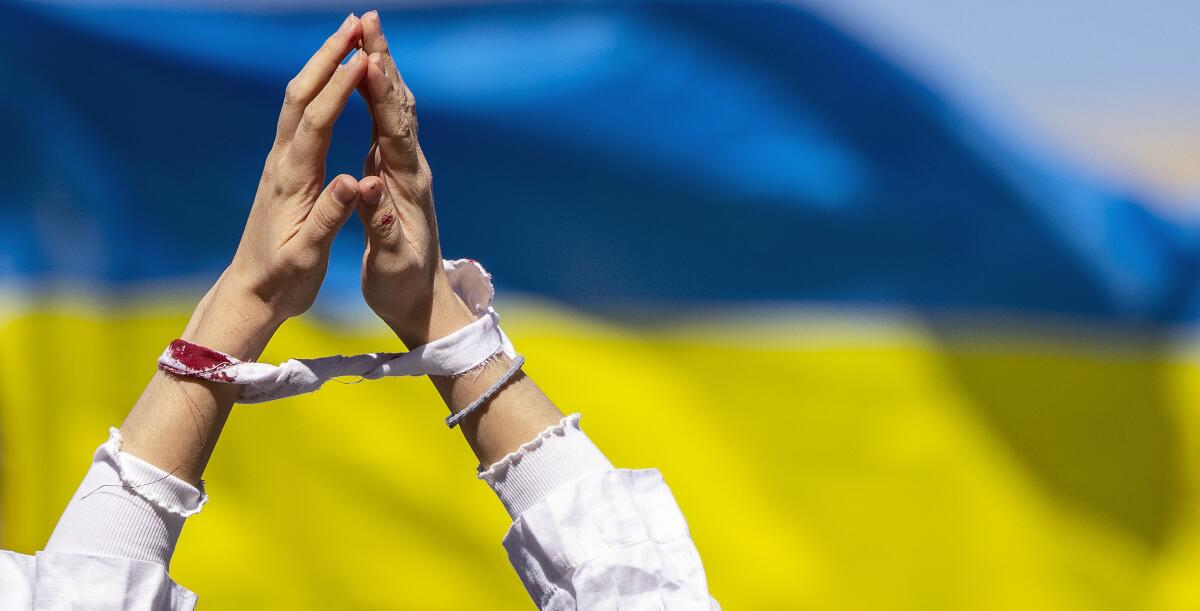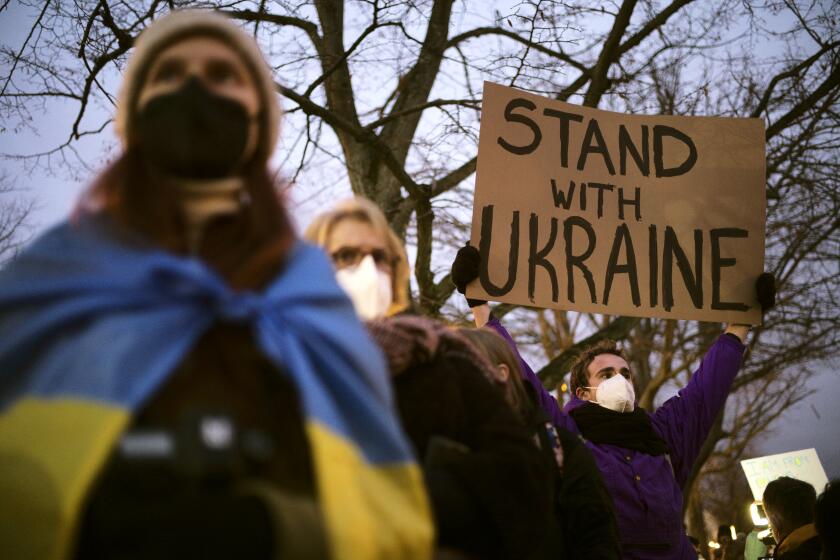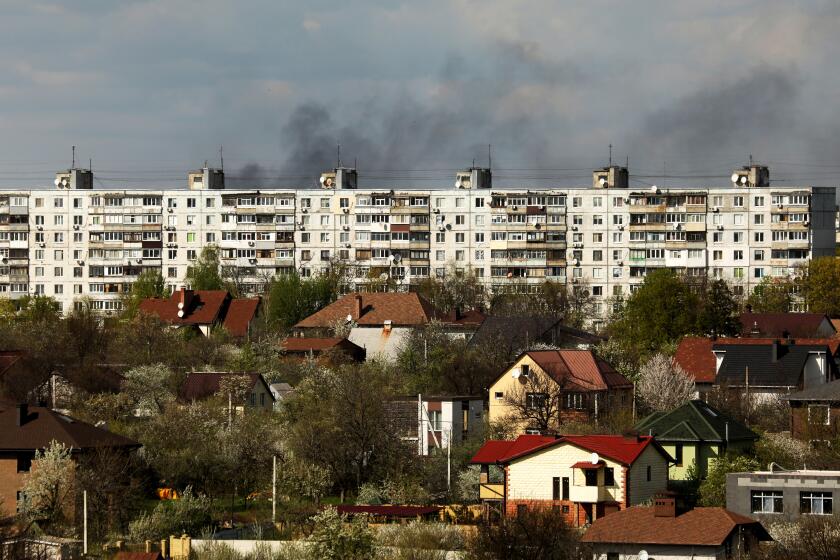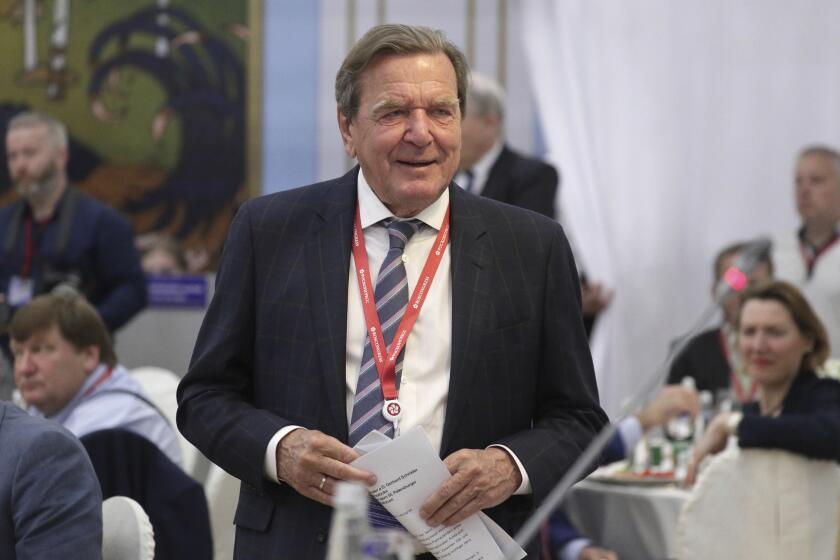News Analysis: Despite now sending arms to Ukraine, Germany remains reluctant to get involved in the war

- Share via
BERLIN — Germany’s announcement this week that it would, after all, arm Ukraine with heavy weapons seemed to mark a sharp departure from its aversion to getting involved in the war and antagonizing Russia.
But political scientists, military experts and opposition political leaders said the decision does not change Germany’s fundamental resistance to playing a leading role in trying to end the war.
They said that German Chancellor Olaf Scholz had little choice but to bend to pressure from international allies and domestic political forces and that the 50 armored vehicles his government promised are a meager contribution compared with military aid flowing into Ukraine from the United States and other NATO members.
“Scholz and his political party still believe in the old Cold War slogan ‘Waffen bringen kein Frieden’ (“Weapons don’t bring peace”), so sending weapons to Ukraine has been anathema for them and still is,” said Thomas Jaeger, a political scientist at Cologne University.
In a country that has harbored deeply pacifist beliefs since the end of World War II, pollsters say a majority of Germans agree with the chancellor. A survey for RTL television on Tuesday found that only 26% believe the government should take a tougher stance against Russia.
“I think it’s a mistake for us to send weapons to Ukraine,” said Thomas Krueger, a 55-year-old manager of a small construction company in the city of Jueterbog. “I wouldn’t do anything to provoke [Russian President Vladimir] Putin in light of all the nuclear warheads they have. Getting into a war with Russia is dangerous for the whole world.”
Many migrants from the former Soviet Union living in Germany support Vladimir Putin.
He blamed the United States for the war by encouraging the expansion of the North Atlantic Treaty Organization to Russia’s doorstep — a belief that is widespread in the formerly communist eastern German states.
Germany and Russia have a long history of wars, revolutions and misunderstandings, but recent generations of German leaders, especially on the political left, have argued that peace and prosperity in Europe is possible only with a stable German-Russian alliance. They worked to deepen economic ties with Russia and raised German dependency on Russian energy to unprecedented levels.
In the buildup to the war, with 100,000 Russian troops massed on Ukraine’s borders, Germany said it could not provide any lethal weapons but would gladly send steel helmets. The offer was roundly mocked, prompting the mayor of the Ukrainian capital, Kyiv, to ask whether Germany would send pillows next.
Since the invasion, the most prosperous country in Europe has been reluctant to use any of its economic and military muscle to try to end the war.
New attacks hit Ukraine’s east and its capital as United Nations Secretary-General António Guterres visits, declaring, “The war is evil.”
Though Scholz suspended the recently completed Nord Stream 2 natural gas pipeline, which would have made his country even more dependent on Russian energy, Germany is still paying Russia $220 million a day for energy — money that critics say is helping Moscow finance its invasion of Ukraine.
In contrast to the United States and much of the rest of Europe, Germany hesitated to sever banking ties with Russia and to provide any arms to Ukraine.
“Germany’s credibility as the champion of European values is under great pressure — other countries are growing very skeptical,” said Lt. Gen. Ben Hodges, a former commander of the U.S. Army in Europe who is now a consultant in Germany.
“Germany should step up and offer to be the framework nation for air and missile defense for NATO’s eastern flank,” he said.
But the dominant feeling in Scholz’s center-left Social Democratic Party has been that instead of arming Ukraine, the West should do more to help Russia find a face-saving way to end the war.
The chancellor has offered multiple reasons for his opposition to sending heavy weapons. He said at first that he wanted to avoid escalating the war, then that he feared provoking Russia, finally arguing that it would take too long to train Ukrainian soldiers how to use the high-tech German tanks and other armaments.
Former Chancellor Gerhard Schroeder is among German dignitaries and artists who have been ostracized or publicly dismissed in the last week because they decline to condemn Russian President Vladimir Putin.
“We can’t have a nuclear war,” he said in an interview with Der Spiegel magazine published Saturday.
The decision Tuesday to send tanks came at the U.S. air base in the small German town of Ramstein, where the United States held a summit to rally 40 countries to provide long-term military support to Ukraine.
“It would have been a total embarrassment for the German government to come to Ramstein, in their own country, still refusing to send heavy weapons to Ukraine,” Jaeger said. “They had to step up their game.”
He noted that most of the heavy weapons on Ukraine’s wish list from Germany were not approved for shipment to Ukraine.
“It looks like they agreed to send the least-useful heavy weapons under consideration,” he said. “It looks like this was just for the sake of appearances.”
Claudia Major, a defense policy expert at the German Institute for International and Security Affairs, said it could take weeks or month to ready the German tanks for battle.
“These are older models, and they need to be refurbished,” she said. “There are several other questions like ammunition, spare parts, maintenance and technical support that still need to be sorted out — and especially the training for the Ukrainian armed forces who haven’t yet worked with this system.”
Major said a German arms maker was holding the decommissioned tanks in storage and had made the offer to refurbish them six weeks ago.
“The Defense Ministry has only now authorized this, or more precisely no longer prevented it,” she said.
Scholz was also facing a domestic rebellion before he bowed to the pressure. The Free Democratic Party and the Greens — both junior partners in his ruling coalition — had been pressing his party do more to support Ukraine.
Foreign Minister Annalena Baerbock, a leader of the Greens, said that the promise to send heavy weapons wasn’t a “snap decision” but had been worked out with the United States and other allies and that there was no doubt that Germany was doing the right thing.
“Otherwise we would have had to tell Ukraine, ‘Go ahead fight on your own,’ and we didn’t want to do that,” she told Parliament on Wednesday. “We want to show our solidarity alongside Ukraine. We want to support Ukraine and its courageous fight for freedom and security in Europe.”
It remains unclear whether the public will eventually come around to that position.
“A lot of Germans think if we don’t hurt anyone else, no one will try to harm us,” Jaeger said. “Most Germans don’t think Ukraine can possibly win this war and a lot of them don’t want Ukraine to win — because they want to go back to business as usual with Russia.”
More to Read
Sign up for Essential California
The most important California stories and recommendations in your inbox every morning.
You may occasionally receive promotional content from the Los Angeles Times.













